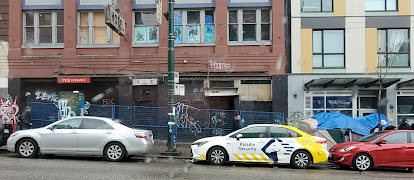Yesterday, Vancouver City Council considered a motion by Cllr Rebecca Bligh focussing on the Downtown Eastside. A copy of the lengthy motion can be found here: https://council.vancouver.ca/20231129/documents/pspcA.4.pdf
Although the motion was highly aspirational, I was pleased that Cllr Bligh proposed it since it acknowledged that the DTES Local Area Plan approved in 2014 has not been working. Sadly, I spoke to Council at the time and predicted it would not work. More specifically, the proposed 60% social housing/40% rental housing requirement that was intended to help deliver social housing units without government subsidies would not work. In fact, it has resulted in only two projects in 9 years.
I also opposed the proposed ban on condominium housing which staff said was necessary to keep land values low, and in turn result in more social housing without the need for government subsidies. Not only did this ban fail to result in new projects, it ensured that the heart of the Downtown Eastside would remain an ugly, low-income ghetto with an increased number of vacant, derelict storefronts. While few will say it. This neighbourhood is a disaster.
Following an interview with CTV's Isabella Zavarise earlier in the week, I decided to sign up to speak at Council yesterday. It was a most unsatisfying experience. For one thing, it was recommended that I make my presentation by phone, which I did. However, a phone conversation is less productive than appearing in person. Or a video presentation. Why doesn't the city allow video presentations in this day and age?
Furthermore, whereas I had 5 minutes to speak in 2014, yesterday speakers only had 3 minutes. I didn't know this when I prepared my remarks. Also, due to a new policy, councillors were not allowed to ask me questions or seek clarifications.
Below are some of the remarks I intended to make. While I didn't hear all the previous speakers, I am led to believe that I was one of only two speakers who argued that the future plan and zoning should allow condominiums in the area. The other was former mayor Sam Sullivan!
Geller Speaking Notes
Introduction
I have been actively involved with the
planning and development of Vancouver's Downtown Eastside for five decades. So.
it has been difficult to condense my thoughts into 5 minutes.
I want to thank Councillor Bligh for
bringing forward this motion. I agree with its comprehensive proposals but there
is one further action I would urge you to include.
The current DTES DEOD plan, approved
by Council in 2014, includes a ban on ownership housing. The forthcoming review
should reconsider this ban. Please do not again close the door on ownership
housing.
Some fear allowing condominiums will
result in the gentrification of the neighbourhood. I disagree. There is already
enough social housing, and much more to come, to ensure it will always remain a
predominantly low-income community.
But a healthy community needs a broad
mix of households. This will only come with a broader mix of housing, including
ownership housing.
Ownership housing will also bring
greater buying power that is necessary if the many derelict storefronts are to
fill up.
As former City Manager Penny Ballem
once told an Urban Land Economics audience, while getting homeless people off
the streets is essential, only once the vacant stores fill up will we know
that our planning is succeeding.
In other words, allowing ownership
housing will not result in gentrification. But it will result in regeneration.
So why do I feel so strongly about
this?
My background experience in the
DTES
I first started working in the Downtown Eastside in 1974 as CMHC’s Program Manager-Social Housing. Even then, there was a desire to replace the SROs with self-contained units, and CMHC funded many new projects, including one at 124 Dunleavy Street developed by the City’s then newly formed Non-profit Housing Corporation.
I should note that this building has already been demolished and replaced. This is indicative of just how old I am. Or how badly the city's building was constructed.
CMHC recognized replacing all the SROs with self-contained apartments was not likely to happen for decades, so it agreed to depart from its policy and funded the renovation of 2 SROs while I was there.
Sadly, in the ensuing years, the city did not enforce its Maintenance Bylaws and these SROs and many others have deteriorated to the point that many residents prefer to live on the streets.
In the 1990’s I was retained by the provincial government to advise on the purchase and renovation of the Washington and Sunrise hotels. Since then, the Province has purchased more than twenty-two additional SRO hotels.
I was also involvement with the Woodwards building, initially on behalf of the province, prior to its purchase of the building, and subsequently on behalf of SFU. I consider this building a success. I would like to see more similar projects with a mix of market and non-market housing, and other community uses.
In 2008, along with Michael Clague, and the late Joe Wai and Milton Wong, I was a founding director of the Building Community Society (BCS) which hoped that by bringing together different interests, solutions could be found to improve the neighbourhood.
I left BCS to run for city council since I thought I might be more effective there. I was the NPAs first loser.
To conclude, I am pleased a review of the plan will hopefully proceed. But based on my five decades of experience in the DTES, as I urged Council nine years ago, please do not again close the door on ownership housing in the DEOD, and do not insist that retail primarily serve local low-income residents. As we have learned since 2014, this will not work.






